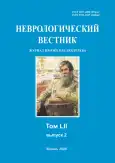Influence of oxygen therapy methods in comprehensive treatment on cognitive functions at correction of alcohol withdrawal syndrome
- Authors: Kopytov D.A.1,2, Bychenko I.V.2, Kopytov A.V.1
-
Affiliations:
- Belarusian State Medical University
- Republican scientific and practice center of mental health
- Issue: Vol LII, No 2 (2020)
- Pages: 52-58
- Section: Original study arcticles
- Submitted: 17.04.2020
- Accepted: 29.05.2020
- Published: 19.10.2020
- URL: https://journals.eco-vector.com/1027-4898/article/view/33772
- DOI: https://doi.org/10.17816/nb33772
- ID: 33772
Cite item
Abstract
Aim. Based on the application of methods of normoxic therapeutic compression and hyperbaric oxygenation in combination with pharmacotherapy for the relief of cognitive impairment in alcohol withdrawal syndrome (AWS), to evaluate the effectiveness of their use to optimize the treatment process.
Methods. 160 patients with AWS were examined: 62 people underwent hyperbaric oxygenation and 56 normoxic therapeutic compression sessions along with symptomatic pharmacotherapy, 42 with drugs in accordance with medical care protocols. To assess the severity of the manifestations of AWS, the CIWA-A scale was used. Diagnosis and clinical verification of the diagnosis of alcohol dependence was carried out in accordance with the research criteria of the ICD-10 and AUDIT. To study cognitive impairment, the Schulte table technique was used.
Results. The use of the method of normoxic therapeutic compression in the complex treatment of AWS increases the “mental performance” after the first day of therapy by 4.6 times, after the third day of therapy, 3.18 times, after the seventh day of therapy, 3.25 times, compared with drugs.
Conclusion. Oxygen therapy methods in combination with pharmacotherapy should be used when stopping cognitive impairment in alcohol withdrawal syndrome, which will increase the effectiveness of treatment and avoid possible cognitive impairment in pharmacotherapy.
Full Text
About the authors
Dmitry A. Kopytov
Belarusian State Medical University; Republican scientific and practice center of mental health
Email: rnpznark@tut.by
Belarus, 220116, Minsk, Dzerzhinsky Avenue, 83; 220053, Minsk, Dolginovsky tract, 152
Il’ya V. Bychenko
Republican scientific and practice center of mental health
Email: rnpznark@tut.by
Belarus, 220053, Minsk, Dolginovsky tract, 152
Andrej V. Kopytov
Belarusian State Medical University
Author for correspondence.
Email: rnpznark@tut.by
Belarus, 220116, Minsk, Dzerzhinsky Avenue, 83
References
- Global status report on alcohol and health. World Health Organization. 2018. https://apps.who.int/iris/bitstream/handle/10665/274603/9789241565639-eng.pdf?ua=1 (access date: 11.07.2019).
- Barnard M., McKeganey N. The impact of parental problem drug use on children: what is the problem and what can be done to help? Addiction. 2004; 99 (5): 552–559. doi: 10.1111/j.1360-0443.2003.00664.x.
- Чуркин А.А., Мартюшов А.Н. Краткое руководство по использованию МКБ-10 в психиатрии и наркологии. М.: Триада-X. 1999; 232 с. [Churkin A.A., Martyushov A.N. Kratkoe rukovodstvo po ispolʹzovaniyu MKB-10 v psikhiatrii i narkologii. (A brief guide to the use of ICD-10 in psychiatry and narcology.) M.: Triada-X. 1999; 232 p. (In Russ.)]
- Корсаков С.С. Болезненные расстройства памяти и их диагностика. М. 1980; 85 с. [Korsakov S.S. Boleznennye rasstroystva pamyati i ikh diagnostika. (Painful memory disorders and their diagnosis.) M.. 1980; 85 p. (In Russ.)]
- Дамулин И.В., Шмидт Т.Е. Неврологические расстройства при алкоголизме. Неврол. ж. 2004; 9 (2): 4–10. [Damulin I.V., Shmidt T.E. Neurological disorders in alcoholism. Nevrologicheskiy zhurnal. 2004; 9 (2): 4–10. (In Russ.)]
- Harper C., Corbett D. Alcoholism and dementia. In: The neuropathology of dementia. M.M. Esiri, J.H. Morris ed. Cambridge: Cambridge University Press. 1997; 294–306.
- Silvers J., Tokunaga S., Berry R. et al. Impairments in spatial learning and memory: ethanol, allopregnanolone, and the hippocampus. Brain Res. Rev. 2003; 43 (3): 275–284. doi: 10.1016/j.brainresrev.2003.09.002.
- Bernardin F., Maheut-Bosser A., Paille F. Cognitive impairment of alcohol-dependent subjects. Front. Psychiatry. 2014; 5 (78). https://www.frontiersin.org/articles/10.3389/fpsyt.2014.00078/full (access date: 12.01.2020).
- Perry C. Cognitive decline and recovery in alcohol abuse. J. Mol. Neurosci. 2016; 60 (3): 383–389. doi: 10.1007/s12031-016-0798-4.
- Андрианова Е.Д., Дамулин И.В., Сиволап Ю.П. Когнитивные расстройства при алкоголизме. Наркология. 2013; 12 (6): 79–85. [Andrianova E.D., Damulin I.V., Sivolap Yu.P. Cognitive dysfunctions during alcoholism. Narkologiya. 2013; 12 (6): 79–85. (In Russ.)]
- Cabe N., Laniepce A., Ritz L. et al. Cognitive impairments in alcohol dependence: From screening to treatment improvements. Encephale. 2016; 42 (1): 74–81. doi: 10.1016/j.encep.2015.12.012.
- Рубинштейн С.Я. Экспериментальные методики патопсихологии и опыт применения их в клинике. Практическое руководство. СПб.: ЛЕНАТО. 1998; 168 с. [Rubinshteyn S.Ya. Ehksperimentalʹnye metodiki patopsikhologii i opyt primeneniya ikh v klinike. Prakticheskoe rukovodstvo. (Experimental methods of pathopsychology and the experience of their use in the clinic. A practical guide.) St. Petersburg: LENATO. 1998; 168 p. (In Russ.)]
Supplementary files







